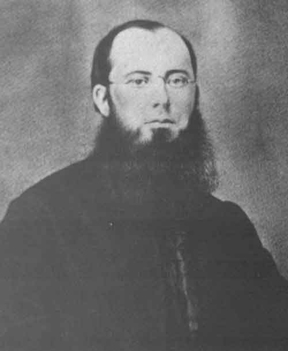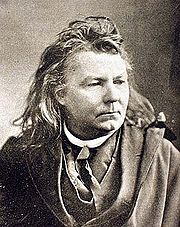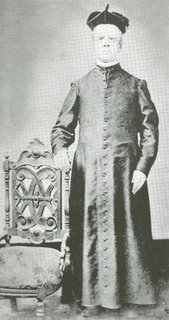
FGF E-Package
The Confederate Lawyer
July 14, 2009
Three Great Chaplains
by Charles G. Mills
GLEN COVE, NY — The Chaplains Corps of the Confederate Army was underfunded and underequipped by the Confederate Congress, and yet it produced some extraordinary men. This is the story of three of them.
Father John B. Bannon, S. J.
Father John B. Bannon was born and ordained in Ireland. His maternal grandfather was part of the titled Irish aristocracy. He immigrated to Saint Louis and was appointed pastor of Saint John the Apostle Parish in 1858. In 1860, he served for about a month as chaplain to a militia unit protecting Missouri from an attack by Kansas. In May, he was captured by Northern troops near his parish and was released in a few days. He then preached sermons in Saint John’s that included statements such as the War was between “the cross and the crescent, for which the last, the Yankee substitutes the dollar; a war between materialism and infidelity of the North, and the remnants of Christian civilization yet dominant in the South.”
The Northern Army decided to arrest him, but he escaped through the back door of the church before they could make the arrest and joined the First Missouri Confederate Brigade as a chaplain. Father Bannon was known for going onto the battlefield with his troops during the battle, in defiance of Confederate Army regulations. There he administered Extreme Unction to dying Catholic soldiers and baptized dying Protestant soldiers who had never been baptized but wanted to be. In 1863, the entire brigade was captured. Father Bannon was released and went to Richmond.
Confederate President Jefferson Davis asked him to undertake a double mission in Europe. Father Bannon took a letter from President Davis to the Blessed Pius IX and had several audiences with the Pope, resulting in the Pope’s letter to President Davis that infuriated the Lincoln government.
He then went to Ireland, where he handed out leaflets on the docks warning those about to sail for America of the dangers of serving in the Northern Army; he also prepared a poster that he distributed to every parish in Ireland. The poster contained President Davis’ letter to Pius IX, Pius IX’s letter to President Davis, and his own statement expressing his confidence “that no Catholic will persevere in the advocacy of an aggression condemned by his Holiness.” Although historians disagree how much Irish recruitment by the Northern Army dropped, they do agree that it was significant. He never returned to America. After the War, he became a Jesuit and lived until 1913.
Father Abram Joseph Ryan, C. M.
Father Abram Joseph Ryan was born in Virginia and grew up in Saint Louis, where he went to a Christian Brother’s school. He studied for the priesthood at Niagara University in New York and was ordained as a Vincentian in 1856. At the outbreak of the War, he was teaching at the seminary in Cape Girardeau, Missouri.
In 1862, he joined the Confederate Army as a chaplain and served throughout the War. His brother, a Confederate soldier, was killed in action. Father Ryan wrote two poems about his brother’s death. After the War, he served in a number of parishes in Mississippi, Georgia, and Tennessee. In 1866, he published a poem about the Confederate flag called “The Conquered Banner”, which immediately became popular throughout the South and was memorized by school children for generations. It was prominently featured in volume I, issue 1, of The Confederate Veteran magazine. By this time, he was the best known Confederate veteran chaplain.
Much of his poetry for the rest of his life featured Confederate themes. He was immensely popular and known as the “Poet-Priest of the Confederacy” and the “Poet Laureate of the Confederacy.” He died in 1886 in a Franciscan monastery. There is a statue of him in Mobile and a stained glass window in New Orleans. A number of memorial plaques in various locations recall his contributions.
Father James Sheeran, C. R.
James Sheeran was born in Ireland and immigrated first to Canada and then to Michigan. He was married and had two children. After the death of his wife, he pursued a religious vocation and was ordained as a Redemptorist in 1858.
He was assigned to a New Orleans parish; when his Redemptorist provincial asked for volunteers as Confederate chaplains, he enthusiastically joined and served with the 14th Louisiana Regiment in the Army of Northern Virginia.
He seems to have been a man of extraordinary courage and determination in doing what he thought was right and a man who rarely conformed to military regulations.
One night, after ministering to the Confederate wounded in a military hospital, he went to the nearby Northern military hospital and found that their wounded were receiving no medical care. He indignantly stormed into the room where the Northern military surgeons were and demanded to know why they were not treating their wounded. They gave a number of excuses, of which the only possibly persuasive one was that they had no bandages. He then went to a number of leaderless Northern nurses and, with an air of authority, ordered them to go to the battlefield and take the shirts, handkerchiefs, and everything else suitable for bandaging from the packs of the dead. When they returned with a large quantity of bandaging material, he ordered them to go to the surgeons and tell them they had plenty of bandages. Within hours, the Northern wounded were receiving medical treatment.
He won a number of confrontations with Confederate General Stonewall Jackson. In one of his confrontations, he is supposed to have said, “General Jackson, I want you to understand that as a priest of God I outrank every officer in your command. I even outrank you.” He even won an argument with Jackson over whether he should have a tent, which no one else had.
He also emerged victorious in a confrontation with Confederate General Robert E. Lee, who reluctantly gave him an indefinite pass allowing him to go anywhere he wanted. He frequently crossed the lines and was arrested in November 1964 by order of Northern General Philip Sheridan. He wrote indignant letters to Sheridan and to Lincoln’s Secretary of War and obtained his release. After he was released, he had a face-to-face showdown with Sheridan over the restrictions placed on him and again prevailed.
After the War, Father Sheeran was released from the Redemptorist Congregation and became a very successful pastor in Morristown, New Jersey.
Father Sheeran died in 1881.
The Confederate Lawyer archives
The Confederate Lawyer column is copyright © 2009 by Charles G. Mills and the Fitzgerald Griffin Foundation, www.fgfBooks.com. All rights reserved.
Charles G. Mills is the Judge Advocate or general counsel for the New York State American Legion. He has forty years of experience in many trial and appellate courts and has published several articles about the law.
See his biographical sketch and additional columns here.
To sponsor the FGF E-Package, please send a tax-deductible donation to the:
Fitzgerald Griffin Foundation
344 Maple Avenue West, #281
Vienna, VA 22180
1-877-726-0058
publishing@fgfbooks.com
or donate online.
@ 2025 Fitzgerald Griffin Foundation


